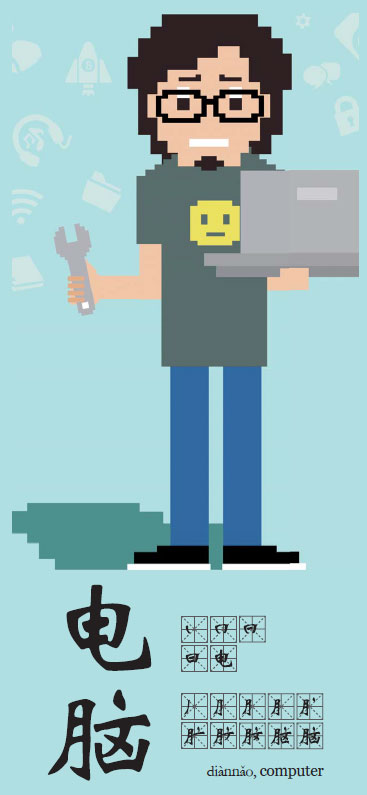Keep calm and call

A computer problem may be traumatic, but it's a chance to build your Mandarin vocabulary, so here's how to deal with tech support
When your screen freezes, you can feel it in the pit of your stomach.
How can that document be gone? Just ... gone? What sort of cruel universe is this? Then comes anger and "percussive maintenance", but the computer responds to your smacks by going completely black.
Then there's bargaining: "I will redo the whole chart if you just come back. Don't take all the other data, you malicious office appliance." After you hold in the power button a few times, sorrow takes hold. Color fades from the world. But, you eventually come to a realization that there's nothing you can do because this is all part of the natural order of things - you're going to have to call for tech support.
As anyone working in an office can attest, the most unpleasant part of the experience happens after the person meant to help you finally arrives - the person invades your work space, asking way too many questions and offering loads of unsolicited advice. At the end of all of the insults, waiting and tutting, you may find yourself wanting to just quit your job.
So, here's a handy guide to prepare for your inevitable tech support situations.
My computer won't start!
Wǒ de diànnǎo kāi bù liǎo jī le!
我的电脑开不了机了!
They, of course, have to ask you a few questions first. Be forewarned: during this process, your intelligence may be insulted and your pride hurt.
Is it plugged in?
Chāshàng diànyuán le ma?
插上电源了吗?
Is the monitor cord loose?
Shìbushì xiǎnshìqì de liánjiēxiàn sōng le?
是不是显示器的连接线松了?
No and no. Finally, the tech guy or gal reluctantly takes your seat. But if it were a simple problem, things would probably be over already. The tech guy, of course, will make sure you know how many other people have made the same mistake and exactly how he feels about it. So they whip up some magic and your computer seems resurrected, but with an unfamiliar interface consisting only of text and codes that might as well be written in Martian. They declare:
Your operating system is damaged and has to be reinstalled.
Nǐ de cāozuò xìtǒng sǔnhuài le, xūyào chóngxīn ānzhuāng.
你的操作系统损坏了,需要重新安装。
With that they pull out a stack of 光盘 (guāngpán, discs), several of which are probably pirated. Remembering the last time your system was reinstalled, you ask:
Do you have an operating system in English?
Yǒu yīngyǔ de cāozuò xìtǒng ma?
有英语的操作系统吗?
Of course they don't. But, hey, perfect time to practice your Chinese computer terminology, or randomly stabbing at tabs in the dark, depending on your Chinese ability. Also, there are far more pressing issues:
Can my files be retrieved?
Wǒ de wénjiàn néng zhǎo huílái ma?
我的文件能找回来吗?
They, ever so annoyingly, answer you with more questions:
Have you saved it? Where did you save it?
Nǐ bǎocún le ma? Nǐ bǎocún dào nálǐ le?
你保存了吗?你保存到哪里了?
Have you backed it up?
Nǐ bèifèn le ma?
你备份了吗?
Ashamed, you confess that you saved it on the 桌面 (zhuōmiàn, desktop) and you never bothered to backup anything - because you're not a nerd. They throw you one of those looks intended for imbeciles and repeat the phrase you know all too well.
I've said it so many times, don't save files on your desktop, it's very easy to lose them during reinstallation.
Wǒ shuōguò hěnduōcì le, búyào bǎ wénjiàn cún zài zhuōmiàn shàng, zhèyàng zài chóngzhuāng de shíhòu róngyì diūshī.
我说过很多次了,不要把文件保存在桌面上,这样在重装的时候容易丢失。
Get into the habit of backing up your files regularly; this will save you a lot of trouble.
Yǎngchéng dìngqī bèifèn de hǎoxíguàn huì jiéshěng hěnduō máfán.
养成定期备份的好习惯会节省很多麻烦。
You: Got it. No problem. I will definitely pay more attention next time!
Míngbái le, méi wèntí , wǒ xiàcì yídìng zhùyì!
明白了,没问题,我下次一定注意!
At some point, you may find yourself pining for the halcyon days of pad and paper over the hateful robot box that has just betrayed you. But such is the price we pay for modernity. A wide range of 故障 (gùzhàng, glitches) might hit your office that the tech support personnel are needed to fix them.
You: My computer crashes a lot.
Wǒ de diànnǎo jīngcháng sǐjī.
我的电脑经常死机。
Tech support: It may have been infected with a virus. What antivirus software do you use?
Kěnéng shì zhòngdú le, nǐ yòng de shì shénme shādú ruǎnjiàn?
可能是中毒了,你用的是什么杀毒软件?
Or he will suggest:
You opened too many files at the same time and your computer's configuration is too outdated; it's time for an upgrade.
Nǐ tóngshí dǎkāi de wénjiàn tài duō, diànnǎo de pèizhì gēn bú shàng, gāi gēngxīn huàndài le.
你同时打开的文件太多,电脑的配置跟不上,该更新换代了。
And then your IT wizard will tell you all about 中央处理器 (zhōngyāng chǔlǐqì, CPU), 内存条 (nèicúntiáo, memory chips), and 显卡 (xiǎnkǎ, display card), which you don't care about because it's all witchcraft.
You: My internet connection is unstable. It keeps breaking off. I often can't even open a webpage.
Wǒ de wǎngluò tèbié kǎ, lǎo diàoxiàn, jīngcháng lián wǎngyè dōu dǎ bù kāi.
我的网络特别卡,老掉线,经常连网页都打不开。
Tech support: Try to clean the cache and reconnect to the network.
Shìshì qīnglǐ huǎncún, zài chóngxīn liánjiē wǎngluò.
试试清理缓存,再重新连接网络。
At the end of the day, the most useful advice you may get from tech support is from the dawn of computer technology:
Have you tried turning it off and on again?
Nǐ shì guò chóngqǐ ma?
你试过重启吗?
Courtesy of The World of Chinese, www.theworldofchinese.com
The World of Chinese

(China Daily Africa Weekly 08/05/2016 page23)
Today's Top News
- Foreign ministers of China, Egypt call for Gaza progress
- Shield machine achieves Yangtze tunnel milestone
- Expanding domestic demand a strategic move to sustain high-quality development
- Xi hears report from Macao SAR chief executive
- Xi hears report from HKSAR chief executive
- UN envoy calls on Japan to retract Taiwan comments






























